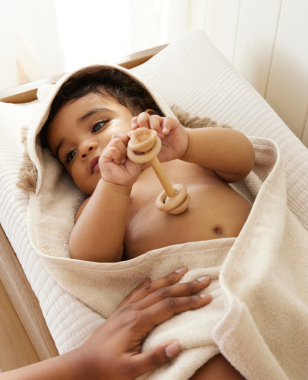7 Tips for Your Baby (And You) to Get A Better Night’s Sleep
Having a new baby is one of the most wonderful experiences in the world, but it also brings about many challenges. Not only do you have a whole new human who depends on you for practically everything, but you sometimes also have to provide that excellent care on little to no sleep. While it’s no secret that babies love to wake up at all hours of the night, there are some things you do to help your child and yourself get a little bit more sleep.

1
Start with a routine as soon as possible
Children need predictable routines. They thrive on them, starting from day one. The quicker you get into a regular routine with your baby, the better off everyone will be. Start at night, around 30 minutes before your baby’s bedtime, and take care of everything like changing clothes, the last bottle of the day and maybe even some cuddling on the rocking chair or play time. It may take some patience, but after a while, your baby will figure out that this nightly routine means it’s time for sleep. Create a similar but shorter routine for daily naps.
2
Let your baby fall asleep on her own
It may be tempting to rock and cuddle your baby to sleep, or to let her fall asleep while nursing or taking a bottle. However, if this becomes a habit, your baby might wake in the middle of the night, looking for you to help her fall back to sleep. Try putting your baby in her crib while still awake and letting her fall asleep on her own. It may be difficult, especially if the baby cries for a few minutes, but a little persistence will pay off after a few nights.
3
Be wary of night feedings
A baby will want to have at least two feedings at night for the first three months. From three months to nine months, that number should dwindle to one, and after nine months, it’s likely that she’ll stop altogether. Every baby is different though, as is the feeding method, so use those ages as a general guide. If you’re still feeding your 15-month-old twice a night and she isn’t sick, it’s time to cut back. Most of the time, the baby just thinks that nursing or bottles are necessary for falling asleep, and you simply need to disassociate that behavior. Diluting the milk with water and eventually just feeding your little one water at night should put a stop to nighttime feedings.
4
Be patient through big changes
Major changes in your child’s life can lead to major sleep disruption. Changes may mean a new bed or even going on vacation and sleeping in a new place for a week. Changes may even mean learning to walk or crawl. If you find yourself in this situation, you may need to start your nightly routine all over again, and be patient. Eventually, your baby will return to old habits.
5
Don’t pick your baby up
immediately after she wakes
When your baby wakes up in the night, your first instinct may be to run to the nursery and scoop her into your arms. Try not to do that. If the baby is awake but not crying, you really don’t have to do anything. If a diaper change is needed, do it quickly and put your baby back to bed.
6
Cut back on late naps and go to bed early
It may be tempting to keep your baby up as late as possible to get her to sleep through the night, but this can actually prevent sleep. Aim for a bedtime around 7 p.m. If your baby is too tired later than that, she will simply fight sleep and be irritable. Also, skip that last nap of the day. Your baby should be awake for the few hours before bedtime, especially after three months.
7
Make sure your baby is comfortable
There may be one little thing about nighttime that’s irritating your baby and keeping her awake. Perhaps the pajamas or socks you chose are a little too scratchy, maybe there is a lump in the sheets or maybe the room is too hot or cold. Maybe it’s just not dark enough. Play around with the light, temperature, clothing and bedding until you get things just right.










